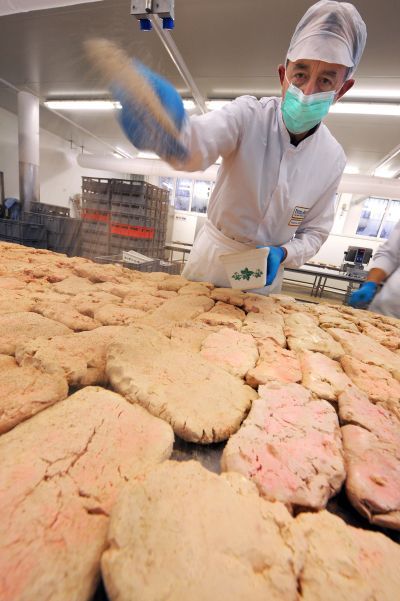Politically correct food on the menu in Britain

Your support helps us to tell the story
From reproductive rights to climate change to Big Tech, The Independent is on the ground when the story is developing. Whether it's investigating the financials of Elon Musk's pro-Trump PAC or producing our latest documentary, 'The A Word', which shines a light on the American women fighting for reproductive rights, we know how important it is to parse out the facts from the messaging.
At such a critical moment in US history, we need reporters on the ground. Your donation allows us to keep sending journalists to speak to both sides of the story.
The Independent is trusted by Americans across the entire political spectrum. And unlike many other quality news outlets, we choose not to lock Americans out of our reporting and analysis with paywalls. We believe quality journalism should be available to everyone, paid for by those who can afford it.
Your support makes all the difference.From foie gras produced without making birds suffer to "sustainable" fish, British retailers and restaurants are fast embracing politically correct food, helped by celebrity-fuelled pressure.
Faux (false) gras is the ethical answer to the foodstuff which has been the bane of campaigners for decades for the way it's produced: force-feeding ducks or geese to create engorged livers that yield the creamy pate.
Waitrose, House of Fraser and Tesco are among a growing number of major British retailers who are now refusing to stock real foie gras after protest campaigns.
Even Selfridges, one of the main attractions for discerning shoppers on London's Oxford Street, decided in November to take foie gras off its shelves after a protest fronted by former James Bond actor Roger Moore.
"It's torture in a tin," said Moore, who appeared on pre-Christmas posters urging Selfridges to halt its sale, stating: "Force-feeding birds is not Yule, it's cruel."
The foie gras ban has even gained the royal seal of approval after Prince Charles, the heir to the throne, ordered it off menus for royal functions.
Waitrose developed the faux gras version - produced without force-feeding the birds - and calls it an "ethical alternative to traditional foie gras".
A darker colour than the real thing, faux gras is made from about 50 percent liver from free-range poultry blended with goose or duck fat.
Two years after its launch, Waitrose customers appear to be increasingly happy to substitute faux gras for the real thing at Christmas and New Year.
"Faux gras is still one of our most popular festive foods," said a Waitrose spokeswoman, who added that sales of the new product surged by almost 60 percent in 2009.
Such is the popularity of the new, more "ethical" version of the product that lawmakers have backed a motion calling for restaurants to adopt the new version and ditch the real foie gras.
"It is only a matter of time before foie gras is relegated to the history books where it belongs," said Sam Glover of lobby group PETA (The People for the Ethical Treatment of Animals).
While the day that five-star establishments abandon such foods seems some way off, restaurants in England do seem to be turning towards "green" alternatives.
Acorn House, in the King's Cross district of London, claims to be the "first truly eco-friendly" restaurant in the capital.
The duck it serves comes from birds raised in a "positive" way, without cages and without antibiotics added to their food; its food deliveries are made in vehicles using biofuel, 80 percent of its waste is recycled and its roof is a herb garden.
"Acorn House is set to alter the image of the restaurant industry as well as transform the way in which people eat out," is the bold claim of its co-founder Arthus Potts.
While most restaurants are not adopting such a radical approach, many are trying to adopt a more ethical approach to their food.
French celebrity chef Raymond Blanc, the holder of two Michelin stars at his renowned restaurant Le Manoir aux Quat' Saisons near Oxford, has embraced a campaign to use fish certified by the Marine Stewardship Council (MSC).
This label guarantees that the fish has been obtained from sustainable stocks.
"By supporting MSC, I am ensuring that, as a chef, I am helping to ensure that fish stocks will be replenished for generations to come," said Blanc, a well-known face in his adopted country thanks to regular TV appearances.
There are 14 MSC-certified restaurants in Britain and although the number remains relatively low, the non-profit organisation argues that its campaign is putting pressure on other restaurants to change their ways.
The main target of the protesters is Nobu, the global chain of chic Japanese restaurants which have the financial backing of Hollywood star Robert De Niro and a strong following among the rich and famous.
Nobu's Michelin-starred London branch is refusing to remove bluefin tuna, an endangered species, from its menu.
Supermodel Elle Macpherson, actress Sienna Miller and comedian Stephen Fry all added their names to a petition protesting against the restaurant's use of the endangered fish.
The restaurant responded by adding an asterisk next to the dish on its menu, directing diners to a footnote saying: "Bluefin tuna is an environmentally threatened species. Please ask your server for an alternative."
Join our commenting forum
Join thought-provoking conversations, follow other Independent readers and see their replies
Comments